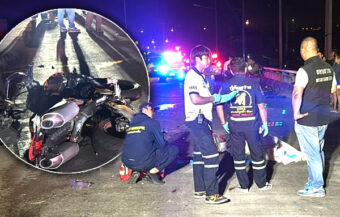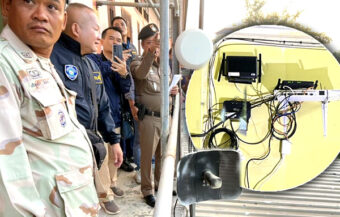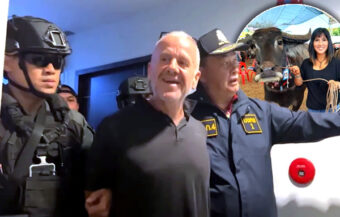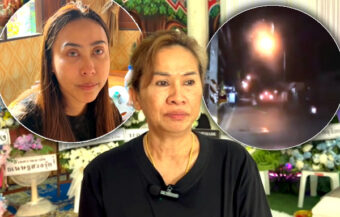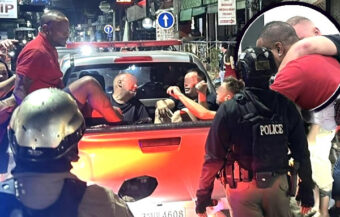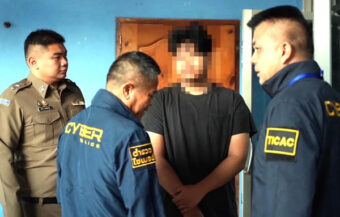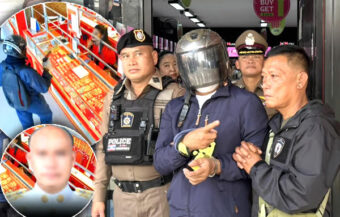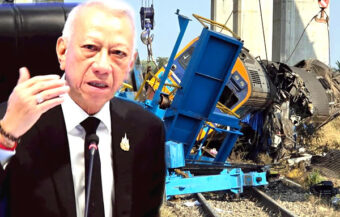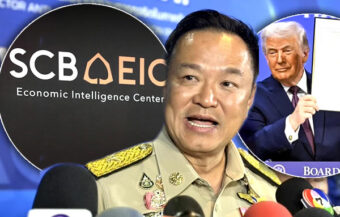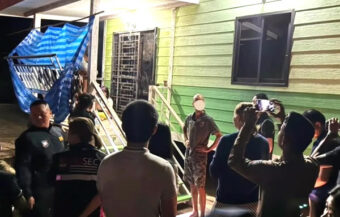Violence erupts on the Sa Kaeo border as Thai soldiers clash with Cambodian civilians. Phnom Penh reacts angrily as tensions soar over cross-border disputes and evictions. In the meantime, Thailand is concerned about gold exports linked with illegality and the multi-billion-dollar scam centre industry.
Frustration in Phnom Penh at the lack of progress in returning the Thai-Cambodian border to normal has led to violent clashes on Thursday in Sa Kaeo Province. It follows decisive action by the Thai military on Wednesday, when encroaching Cambodian settlers were removed from land in Trat. Cambodia on Thursday used its citizens to challenge the Thai military and police in the Khok Sung District of Sa Kaeo Province. The operation led to violent clashes, which saw Thai officers injured and resulted in tear gas and rubber bullets being fired. In recent days, top Thai military figures have doubled down on a hardline stance towards Cambodia, including the need to tackle its runaway scam centre industry, which is having devastating effects on victims in Thailand and in countries across the world.
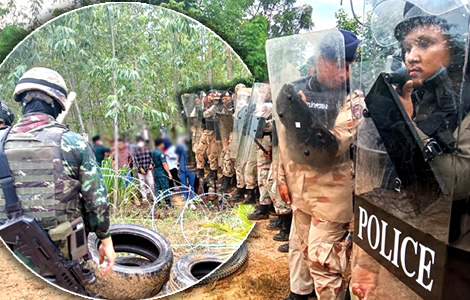
Tensions erupted violently along the Thailand-Cambodia border on Thursday, marking the latest escalation in a long-running dispute. Thai military forces and police clashed with Cambodian civilians at Ban Nong Ya Kaeo, Khok Sung District, Sa Kaeo Province. Crowds surged to dismantle a temporary barrier made of razor wire and tyres. Consequently, Thai riot control officers fired tear gas and rubber bullets to disperse the protesters. Four Thai police officers were injured during the confrontation, including Pol. Lt. Col. Somchat Nakphon and Police Sergeant Major Saeng Arun Sriwongchan.
The clash lasted for several hours. Authorities reinforced the area with additional barbed wire and car tyres. They also deployed high-frequency loudspeakers to control the crowd and restore order.
Thai officials emphasised that all actions occurred within sovereign territory. Moreover, the Ministry of Foreign Affairs accused Cambodian authorities of inciting the crowd, which violated the ceasefire agreement. Despite repeated warnings, provocations continued, forcing officers to act decisively.
Clashes at Ban Nong Ya Kaeo escalate as Thai forces use tear gas and rubber bullets to control crowd unrest
Earlier in the week, tensions had already been high. On Wednesday, Thai forces removed Cambodian settlers encroaching on land in Trat province. The Royal Thai Army warned Cambodia not to use civilians as pawns in the territorial dispute.
Simultaneously, Thailand detected more Russian-made PMN2 landmines in Sisaket Province, raising serious security concerns. The discovery highlights risks to both civilians and military personnel near the border. Outgoing Second Army Chief Lieutenant General Boonsin Padklang spoke in Khon Kaen on Wednesday. He said the struggle with Cambodia is far from over. He also warned that border crossings cannot reopen until Cambodia demonstrates genuine reform.
Meanwhile, Prime Minister Anutin Charnvirakul faces pressure to reopen trade routes. Reports indicate that Japanese companies and those of third-party countries depend on border commerce. Furthermore, illegal gold exports and the scam centre industry exacerbate tensions.
The border dispute dates back decades. In July, clashes erupted after discussions between Cambodian Prime Minister Hun Sen and ousted Thai Prime Minister Paetongtarn Shinawatra. These talks preceded Shinawatra’s removal by the Constitutional Court on August 29. Consequently, disputes over territory have intensified, with both countries accusing each other of violating historical agreements. A UN report in June identified Phnom Penh as a hub for illicit operations affecting Thailand and the wider world.
On Thursday, the situation escalated when Cambodian villagers actively removed Thai barriers. The crowd ignored repeated warnings, and provocations continued. Riot control officers used tear gas, rubber bullets, and high-frequency loudspeakers.
Border trade tensions and historical disputes trigger renewed clashes with villagers dismantling Thai barriers
Eventually, the area returned to calm, but Cambodian villagers remained near the border, keeping tensions high. Thai officials insisted their actions were proportionate and adhered to human rights standards. Additionally, they stressed that Cambodian incitement violated prior ceasefire agreements.
In response, Cambodian Prime Minister Hun Manet called for renewed international intervention. On September 17, 2025, he wrote letters to ASEAN Chair and Malaysian Prime Minister Anwar Ibrahim, Chinese President Xi Jinping, US President Donald Trump, French President Emmanuel Macron, UN Secretary-General António Guterres, and Annalena Baerbock.
He requested enforcement of the ceasefire and protection of civilians. Hun Manet accused Thailand of expanding the conflict beyond Preah Vihear and Oddar Meanchey provinces. According to the Cambodian government, Thai forces installed barriers, issued ultimatums, and forcibly evicted civilians from Chouk Chey and Prey Chan villages in Banteay Meanchey.
Twenty-five families have been prevented from returning home. Hundreds more face threats of eviction.
Hun Manet demands international support to enforce ceasefire and protect Cambodian civilians
Moreover, sources indicate Thailand may target 17 additional areas from Pursat to Koh Kong. Consequently, Cambodia views these actions as violations of sovereignty and international law.
The Cambodian Ministry of Foreign Affairs stressed that Thailand relied on unilateral maps, ignoring historical treaties from 1904 and 1907. The 2000 Memorandum of Understanding on land boundaries prohibits unilateral military measures or expansion of conflict zones.
Furthermore, Cambodia described Thailand’s actions as threatening international law, human rights, and regional stability. Hun Manet is the son of dictator Hun Sen, and Cambodia’s relatively new prime minister.
He urged world leaders to enforce agreements, halt civilian expulsions, and ensure the safe return of displaced people. Hun Manet also emphasised peaceful resolution through negotiation frameworks, including the Joint Border Committee and General Border Committee. He called for the immediate release of 18 Cambodian soldiers detained in Thailand.
Cambodia warns Thai unilateral actions violate treaties and urges peaceful resolution through committees
In addition, Cambodia reaffirmed its commitment to international law, stability, and ASEAN cooperation. The prime minister warned that continued unilateral military actions could provoke violence and undermine regional peace.
Meanwhile, the Thai military has maintained a firm stance. Lieutenant General Boonsin Padklang reiterated that border crossings would remain closed until Cambodia proves trustworthy.
He warned that Thailand would not compromise on security, even under international pressure. Thai officials confirmed that any unlawful activity by Cambodian leaders within Thai territory could be addressed under domestic law. Furthermore, authorities emphasised that measures taken were necessary to protect civilians and national sovereignty.
Economic considerations add urgency to the dispute. Border trade affects Japanese companies and other foreign operations. A surge in gold exports to Cambodia and illicit activities worsens tensions. Indeed, this is a key factor in an appreciation of the baht, which has damaged Thai competitiveness.
Economic concerns heighten border dispute as gold exports surge and the baht appreciates
Meanwhile, scam centres in Cambodia target victims worldwide and contribute to criminal networks. Consequently, border security has direct implications for both economic stability and public safety. The Sa Kaeo incident illustrates the fragile nature of the ceasefire.
The Thai military insisted its responses were proportionate and lawful. Riot control measures followed international standards. At the same time, Cambodia accused Thailand of violating sovereignty and human rights. Both countries now face international scrutiny to uphold agreements and prevent escalation.
On Wednesday, Hun Manet posted a photograph of a meeting with Chinese President Xi Jinping. He highlighted China’s support for a ceasefire and peaceful resolution.
ASEAN and world leaders are now under pressure to ensure compliance with agreements and protect civilians. Furthermore, international actors are urged to mediate and prevent the conflict from spreading.
Scam centres and ceasefire violations intensify with border clashes raising calls for international intervention
The dispute involves longstanding territorial claims, historical treaties, and modern security concerns. Cambodia asserts that Thailand’s actions violate the 1904 and 1907 treaties and the 2000 MOU. Thailand contends that all measures protect sovereignty, prevent illegal incursions, and maintain national security. Both sides have expressed willingness to negotiate, yet mistrust remains high.
The border area remains tense, with Thai forces closely monitoring crossings. Any attempt to remove security measures or breach borders will trigger an immediate response. The Royal Thai Army aims to de-escalate while ensuring territorial integrity. Additionally, both governments must navigate economic, political, and security pressures simultaneously.
The situation remains volatile and critical. Border monitoring, diplomatic engagement, and strict adherence to ceasefire agreements will determine the dispute’s course.
There appeared to be an understanding on the Cambodian side that the new government of Anutin Charnvirakul would see a return to normal. But this is stoutly resisted by the powerful Thai military. In addition, Prime Minister Anutin has in recent days confirmed the hardline stance.
Mistrust and ongoing military vigilance keep Thailand and Cambodia in a tense standoff at the disputed border
Both Thailand and Cambodia face intense scrutiny from ASEAN, the US, and global actors. Observers warn that failure to act could escalate the situation further. While small-scale clashes have occurred, both countries have indicated interest in avoiding full-scale war.
International oversight is now essential. ASEAN, China, and US mediation may prevent further civilian harm. Both governments must uphold agreements and seek a peaceful resolution. The incidents at Ban Nong Ya Kaeo and other border points reveal the volatility of the area. Thai officials claim restraint and legality in all actions, while Cambodia continues to protest. Civilian safety remains a priority, as forced evictions and provocations increase risks.
Incoming minister Chaichanok Chidchob’s strong line on Cambodian border with crossings to be kept shut
Royal Thai Army moves to halt free for all illegality that has long plagued the Thai-Cambodian border
Thailand and Cambodia must balance military readiness, economic needs, and civilian protection. The role of international actors remains pivotal. Both sides are expected to adhere to the 2000 MOU and prior treaties. Only negotiation and diplomacy can prevent the border dispute from spiralling into wider conflict.
The Thursday clashes are undoubtedly caused by frustration in Phnom Penh. Hun Sen and his son feel it is time for the new government in Bangkok to put an end to the dispute. Its real origins are understood to be veiled. Certainly, it is linked with the massive multi-billion-dollar scam centre industry, but it is also tied to cross-border access and, whether inadvertently or not, support from Thailand.
Join the Thai News forum, follow Thai Examiner on Facebook here
Receive all our stories as they come out on Telegram here
Follow Thai Examiner here
Further reading:
2nd Army chief warns Acting PM Cambodian regime cannot be trusted and that border must stay closed
Charged situation – Defence chiefs from Thailand and Cambodia meet in Kuala Lumpur. ASEAN damaged
Fear on Eastern border under Martial law. Cambodian Bond nabbed on ฿162 a day from Phnom Penh regime

